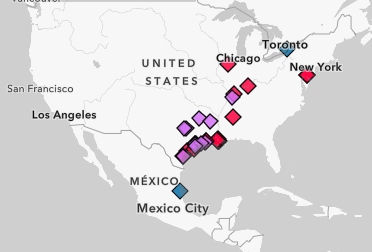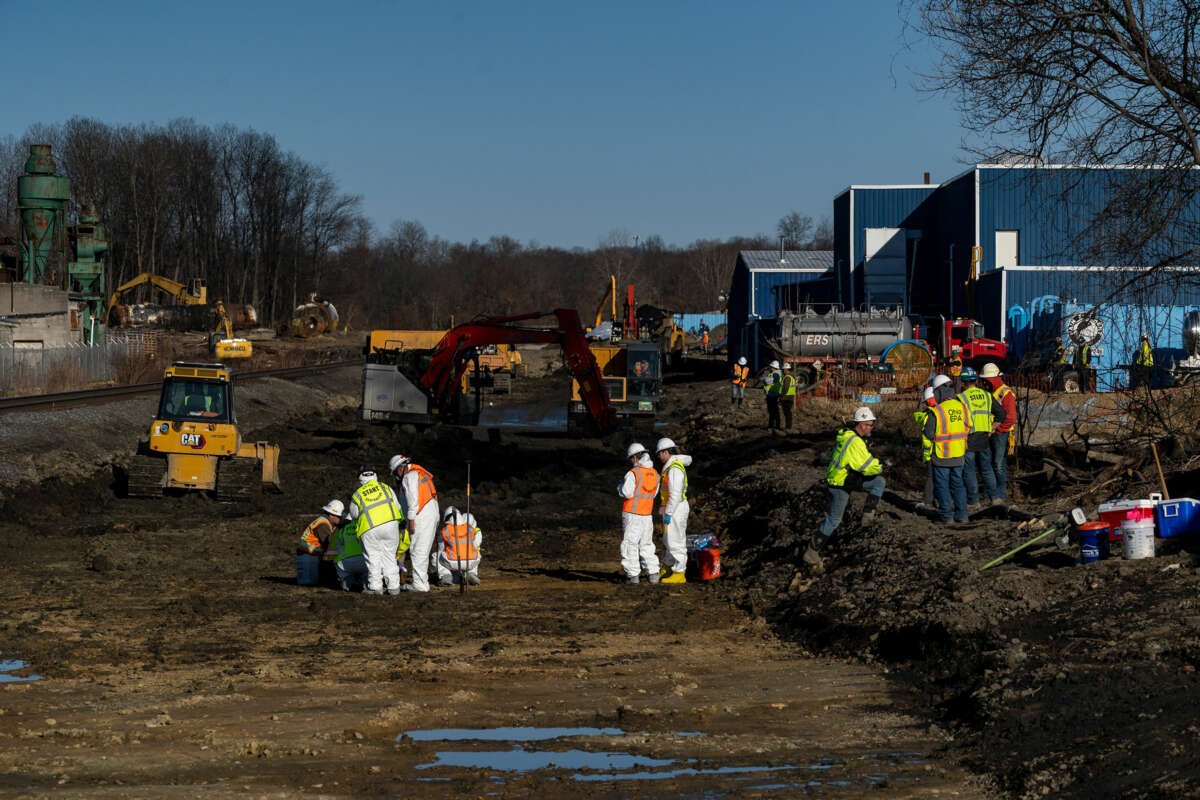Support justice-driven, accurate and transparent news — make a quick donation to Truthout today!
This story was originally published by The New Lede.
When a Norfolk Southern train transporting hazardous material derailed in East Palestine, Ohio on February 3, the subsequent release and explosion of chemicals fouled the air and exposed the community to a toxic cocktail of contaminants, including a substance known to cause cancer called vinyl chloride. More than two months later, air sampling data continues to show elevated levels of vinyl chloride in the area, and residents fear for their health.
A new report released last week shows that what happened in East Palestine was far from an isolated incident, and that people across the country are regularly exposed to vinyl chloride pollution, particularly those living in low-income areas and communities of color.
“It is outrageous that so many communities are being exposed day-in and day-out to the same dangerous chemical and plastic that burned in the Ohio train derailment,” Mike Schade, director of Mind the Store, a program of Toxic-Free Future, said in a statement accompanying the report.
Vinyl chloride is a colorless gas used to make polyvinyl chloride (PVC) plastics used for such things as pipes, vehicle upholstery, and plastic kitchen ware.
Vinyl chloride contamination is primarily emanating from petrochemical production and waste disposal facilities, according to the report issued April 13 by the nonprofit Toxic-Free Future.
The group said it analyzed data collected by the US Environmental Protection Agency (EPA), finding that in 2021, US vinyl chloride and PVC plastic producers released more than 400,000 pounds of vinyl chloride into the air, and that just five companies account for more than 97% of the nation’s vinyl chloride air pollution.
Those five – Westlake Chemical, Formosa Plastics, Occidental Chemical, Shintech, and Orbia – collectively manufacture more than 10 billion pounds of vinyl chloride per year, according to Toxic-Free Future.
A spokesman for Westlake said the company “is committed to operating in a safe and environmentally responsible manner and works with state and federal regulatory authorities to minimize emissions.”
The other companies either did not respond to requests for comment or declined to comment.
Westlake is the top vinyl chloride air polluter in the US, releasing 185,807 pounds of vinyl chloride into the air from its chemical plants in Kentucky, Louisiana, and Mississippi in 2021, the report by Toxic-Free Future states. The group says Westlake has “repeatedly been fined for violating federal environmental, workplace safety, and railroad safety laws.”
Cancer risk
Exposure to vinyl chloride is associated with an increased risk of liver cancer, brain and lung cancers, lymphoma, and leukemia. The chemical is a severe irritant to the skin and eyes and may irritate the lungs. Exposure can also result in depression of the central nervous system, irregular heartbeat, and nerve and liver damage.
Occidental Chemical and Shintech, manufacturers of vinyl chloride and PVC plastic that burned in the East Palestine train derailment, together generated nearly 105,000 pounds of vinyl chloride air pollution in 2021.

Nineteen chemical plants in the US produce vinyl chloride and PVC plastics in Texas, Kentucky, Louisiana, New Jersey, Illinois, and Mississippi. Production and disposal facilities tend to be concentrated in low-income communities of color. According to the report, 63% of people living within a three-mile radius of these facilities are people of color.

A company called Lubrizol reported releasing 1,144 pounds of vinyl chloride from its plant in Louisville, Kentucky into the air in 2021, a data point dubbed “horrific” by Eboni Cochran, co-director of Rubbertown Emergency ACTion (REACT) in Louisville.
Cochran said 82% of people living within a 3-mile radius of the Lubrizol plant are people of color.
“This is just one more glaring example of how systemic racism rears its ugly head,” she said.
Lubrizol did not respond to a request for comment.
Toxic shipments
Production of vinyl chloride and PVC can also create hazards when the material is disposed of, or transported, as the February train derailment demonstrated.
More than 20 million pounds of hazardous chlorinated waste was shipped to incinerators and landfills in the south-central US in 2021. Burning the material can form a class of toxins called dioxins, which are also carcinogenic and are extremely hazardous to human health.
Some are calling for government and retailers to take action to ban or phase out vinyl chloride.
“Vinyl chloride is primarily used to make plastic and was designated a human carcinogen in 1974. Here we are 49 years later, still dealing with the immense health and environmental problems caused by this chemical during production, transportation, use, and disposal,” said Judith Enck, president of Beyond Plastics and a former EPA regional administrator, in a statement.
Enck said environmental regulators and private businesses need to take action to ban vinyl chloride and “transition to safer substitutions.” She has called on the EPA to ban vinyl chloride.
Proposed restrictions or bans face strong industry opposition. Vinyl chloride is used to make PVC widely used in construction materials as well as an array of consumer products, from home flooring and shower curtains to children’s toys and automotive equipment.
Gerald Markowitz, co-author of the book Deceit and Denial: The Deadly Politics of Industrial Pollution, said the industry is increasing production of this carcinogenic chemical despite decades-long understanding of its health risks.
“What is all the more shocking is that the chemical industry has known for half a century about the danger of vinyl chloride and specifically its ability to cause cancer,” he said in a statement. “Yet it has continued to expand its production, transportation, and disposal, putting people, especially people of color and the poor at risk of disease and death.”
Press freedom is under attack
As Trump cracks down on political speech, independent media is increasingly necessary.
Truthout produces reporting you won’t see in the mainstream: journalism from the frontlines of global conflict, interviews with grassroots movement leaders, high-quality legal analysis and more.
Our work is possible thanks to reader support. Help Truthout catalyze change and social justice — make a tax-deductible monthly or one-time donation today.
